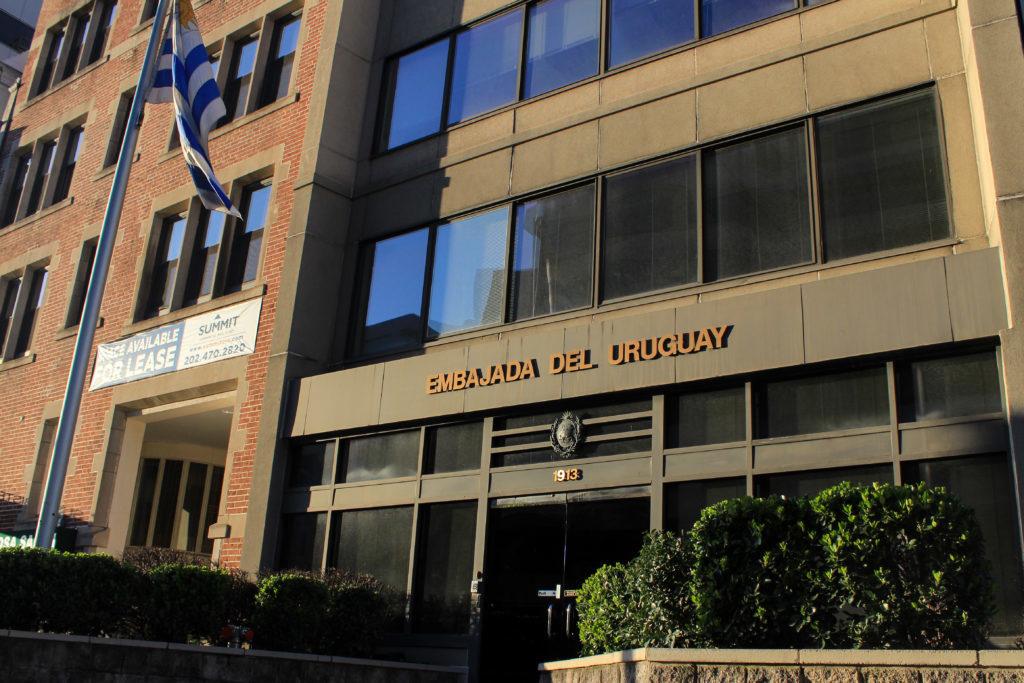More than two dozen educators from Uruguay made the Science and Engineering Hall their classroom one day this month.
The Graduate School of Education and Human Development hosted a one-day seminar with the Fulbright Commission for 26 primary and secondary teachers and administrators from Uruguay on U.S. teaching methods earlier this month. Educators who planned and attended the event said the Uruguayan teachers learned about U.S. education practices and how to apply them to their own classrooms.
The Uruguay Educator Exchange Program is a short-term exchange in which Uruguayan K-12 teachers travel to the U.S. for two weeks to learn about different teaching styles, according to the program description. This is the first time GW has hosted the program.
Laura Engel, an assistant professor of international education and international affairs, said the seminar focused on U.S. educational curriculum and assessment, global education programs, innovative use of technology and English language teaching, with a final panel on education policy futures in the U.S. and Uruguay.
Engel said the 26 teachers and administrators heard GSEHD faculty speak at the seminar about education in the U.S. and around the world.
“As the world continues to become more interconnected and interdependent than ever before, these kinds of opportunities are wonderful ways to exchange ideas, connect with educators from other systems, give us insights into our own U.S. education system, and promote global civic engagement,” Engel said.
GW was placed among the top producers of Fulbright scholars for the ninth consecutive year, with 12 undergraduate and graduate students snagging the awards during the 2016-2017 academic year.
Patricia Vargas, a Uruguay Fulbright Commission fiscal officer, said in an email that one goal of the program is to provide opportunities for the teachers to learn about global issues, be exposed to Uruguayan and U.S. culture and work together on projects.
“The Uruguay – US Teacher Exchange Program is designed to create linkages between participants and communities and to promote innovative ideas in teaching and school administration,” Vargas said.
After the seminar at GW, the group of educators went to Texas for a two-week study visit, which included observations of public schools and their teachers.
David Aronofsky, a legal and educational consultant for the Texas International Education Consortium who planned the program, said he has been working as a teacher in Uruguay annually since 2001 and started working with the Fulbright program in 2014. He said he was asked to help plan the seminar and trip to D.C. and Texas this year.
“The purpose is to expose them to the United States generally because none of them have spent anytime in this country,” he said. “In fact most of the educators who came in this group had never traveled abroad.”
Four sponsors co-financed the program: The U.S. State Department, the Uruguay Fulbright Commision, the Uruguay Education Ministry and The Plan Ceibal program, Uruguay’s largest non-governmental organization.
Teachers from across Uruguay apply for the spots in the program. Aronofsky said 26 were chosen from a pool of about 90.
Aronofsky said Uruguayan teachers should see how public schools in the U.S. operate because the systems are different.
“School started this week and I am getting a lot of feedback already seeing how some of the things they picked up are already starting to appear in the school buildings and in the classrooms,” Aronofsky said.
Eduardo Würth, a physics teacher in Uruguay who attended the program, said he will use what he learned about U.S. classrooms in Uruguay by improving timing and classroom organization. He also plans to start a robotics club at his school, he said.
“Education and educators share some problems worldwide, access to information and technology, curricula, assessment and budgets,” Würth said. “I found particularly interesting how important you take the problem of globalization and the emphasis they put in making schools becoming more global and integrated.”
Paula García, a music teacher in Uruguay who attended the program, said this was the first time music teachers were allowed to apply for the program. The program is useful for Uruguayan teachers because they get the opportunity to see American culture and traditions and that experience can “empower our teaching practices later,” she said.
“It also taught me about the teachers and students routines in the classroom and at school, where there is a wide range of ethnical diversity,” García said. “I could open my mind to other methodologies and ways of teaching in my context, and also to be less afraid about teaching by social emotional methods.”




